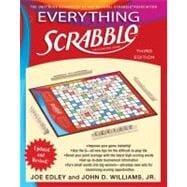
Note: Supplemental materials are not guaranteed with Rental or Used book purchases.
Purchase Benefits
What is included with this book?
The New copy of this book will include any supplemental materials advertised. Please check the title of the book to determine if it should include any access cards, study guides, lab manuals, CDs, etc.
The Used, Rental and eBook copies of this book are not guaranteed to include any supplemental materials. Typically, only the book itself is included. This is true even if the title states it includes any access cards, study guides, lab manuals, CDs, etc.
1
LOOK IT UP: The Official SCRABBLE™ Players Dictionary, Fourth Edition
If you want to get serious about the SCRABBLE™ game, sooner or later you are going to need The Official SCRABBLE™ Players Dictionary (OSPD). It's the "bible" of SCRABBLE word game enthusiasts and, like any important book, has a story.
Back in the dark ages, if two people were playing the SCRABBLE game, chances were they occasionally had an argument about which words were acceptable. To help decide these arguments, there has always been a variety of excellent dictionaries on the market. But while Aunt Ethel from Wyoming always used one dictionary, Uncle Dave from Nebraska used another. Invariably you could watch them battle the merits of their favorite words or nonwords late into the evening.
To clear this potential word-game roadblock, Selchow & Righter, the game's manufacturer, decided in 1975 to publish an official SCRABBLE dictionary. One of the challenges facing the company was how to get the word experts to agree upon the entries. Should it be an unabridged dictionary? Or should it simply contain the words used in everyday English?
The end result -- The Official SCRABBLE™ Players Dictionary -- fell somewhere in between the two extremes. Based on listings from five popular dictionaries, it lists only two- to eight-letter words. Longer words are included as inflections of shorter words (UNLIKELIEST is the superlative of UNLIKELY). To be included in the OSPD, a word had to be found in two of the five most popular American dictionaries. At the time, that collection of five was composed of Webster's Seventh Collegiate Dictionary, Webster's New World Dictionary, Random House Collegiate Dictionary, American Heritage Dictionary, and Funk & Wagnalls College Dictionary.
When it was finally published in 1978, the OSPD included more than 100,000 words. This was a SCRABBLE game player's dream!
As one might imagine, there are arguments over why certain words are included or excluded. With the number of unusual words, some people are unconvinced that the words come solely from popular dictionaries. Yet, for all its faults, the OSPD is the breakthrough that SCRABBLE needed to surge in popularity. Now any two North Americans could play using the same word source.
There are still the occasional gripes over the brief or unusual definitions (KANE is defined as KAIN, which you then have to look up to discover is "a tax paid in produce or livestock"), and few people are certain how to pronounce many of the words, since there are no pronunciation marks in the OSPD. However, the original OSPD edition in 1978 was generally praised as an excellent reference source for settling any SCRABBLE game word disagreement.
In 1991, Hasbro, Inc., the game's new manufacturer, and Merriam Webster published The Official SCRABBLE™ Players Dictionary, 2nd edition, which was followed by the 3rd edition in 1995, and the fourth edition in 2005.
Here are some hints on using The Official SCRABBLE™ Players Dictionary, Fourth Edition:
A) Only one definition is given for each word. Often the common meaning will be bypassed to illustrate an unusual usage. For example, IMP is listed as a verb, and is defined: "to graft feathers onto a bird's wing." The verb usage is necessary to show that IMPED and IMPING are acceptable. For the purposes of the game there was no need to mention other definitions.While there may always be discussions about which words should or should not be acceptable, we must always defer to the OSPD4, so that we are all playing by the same rules. We should not forget that the OSPD4 allows equal chances to all players.
Now that you've been introduced to the OSPD4, let's look at a few basic SCRABBLE game rules that you'll need to know.
One last comment for those who once used the OSPD2: DA, DEI, DES, KEV, VIN(S) and VON were all removed from the OSPD3. These words were reviewed and ultimately rejected as unacceptable by both the Merriam-Webster Company and the NSA's Dictionary Committee. For the OSPD4 EMF was deemed a mistake as well, and so removed. Original edition copyright © 1994, 2001, 2009 by John D. Williams, Jr., and Joe Edley